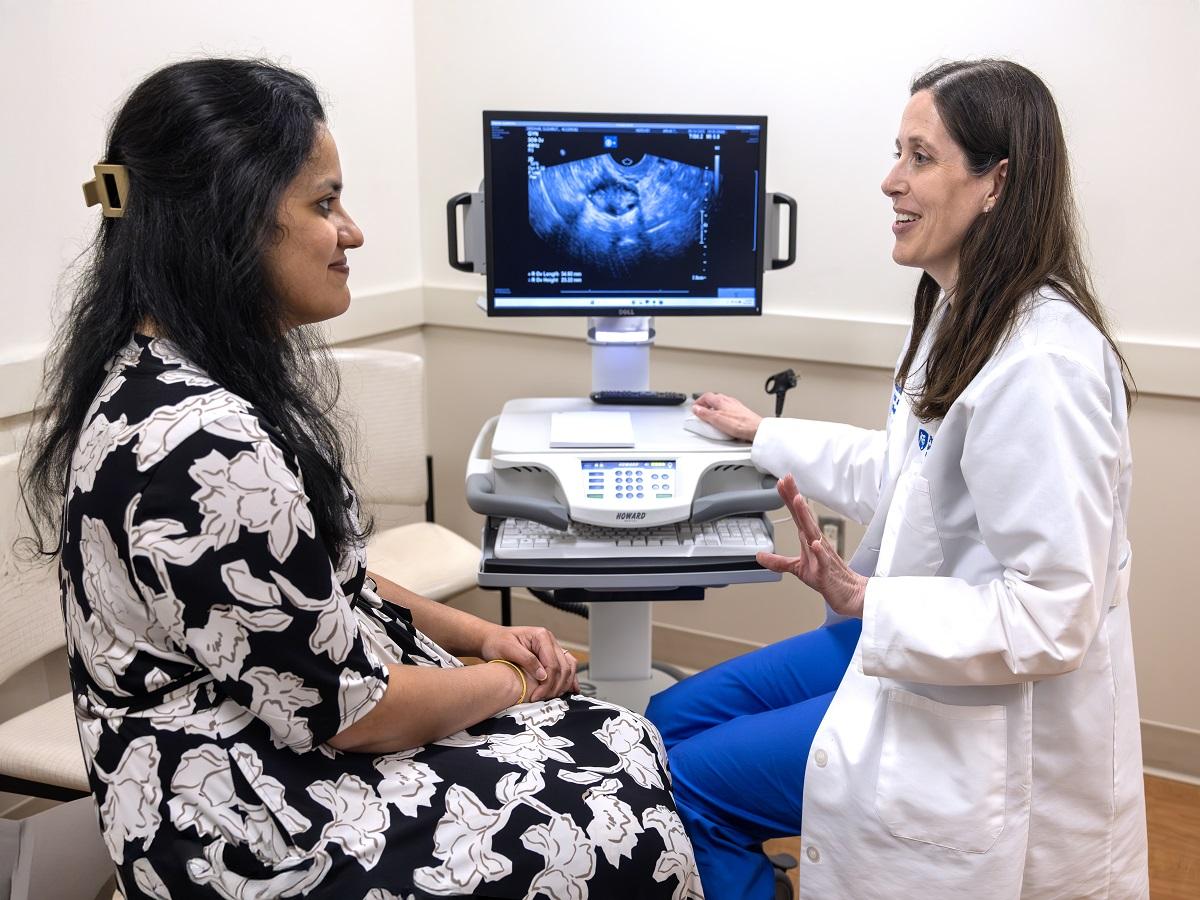UNIVERSITY PARK — When Sushrutha Sridhar, endocrinology, diabetes and metabolism fellow at Penn State College of Medicine, began noticing irregular menstrual cycles, annoying facial hair and weight gain while in medical school in 2018, she knew something was off. She was 27 and hoped to start a family once her medical training was complete, she said. An ultrasound revealed that she had polycystic ovarian syndrome (PCOS).
Sridhar is one of more than 5 million women in the United States with PCOS, the most common hormone disorder among women, according to the Endocrine Society. While many people associate PCOS with ovarian cysts, Richard Legro, chair of the department of obstetrics and gynecology at Penn State Health Milton S. Hershey Medical Center, said the term is misleading.
“There aren’t necessarily cysts on the ovaries. Women with PCOS aren’t ovulating regularly, so the tiny follicles never become cysts. It involves the ovaries, but it’s not exclusively about the ovaries,” Legro said.
A complex diagnosis with common symptoms
Stephanie Estes, a reproductive and infertility endocrinologist at Penn State Health Obstetrics and Gynecology, said PCOS can come with a variety of different symptoms.
“PCOS is diagnosed when women have irregular menstrual cycles, often excess hair growth or acne and sometimes polycystic ovarian morphology, meaning the way the ovaries look on an ultrasound,” Estes said. “It’s also a cause of androgen excess in women.”
Androgens — hormones like testosterone that are typically considered male — can cause some of the trademark signs of PCOS, including acne, facial hair growth and female pattern hair loss. Since the hormones are out of balance, women with PCOS don’t ovulate regularly, which makes it harder to get pregnant.
PCOS commonly runs in families, but there’s not yet enough research to confirm the condition is hereditary, Estes said. Women can be diagnosed as early as two years after their first period, but it’s more common to be diagnosed in their 20s and 30s when they try to start a family.
“A lot of women go to their family doctors with irregular periods and they’re told, ‘Oh, you’re just young. Go on these birth control pills,” Estes said. “But often, they don’t receive a full hormonal workup. The benefit of Milton S. Hershey Medical Center and our affiliated practices is our focus on diagnosing PCOS early, rather than delaying care.”
Hormone management, weight loss ease PCOS
Since hormone imbalance is the root cause of PCOS, the first step in treatment often involves combined birth control pills. Estes explained that estrogen in birth control pills increases a protein that binds to androgens and helps reduce symptoms like acne and unwanted hair. Progesterone also lowers the risk of uterine cancer by regulating menstrual cycles.
Beyond hormonal management, Estes said an exercise regimen and weight loss are often effective. After her diagnosis, Sridhar was prescribed Metformin, a diabetes drug often used to treat PCOS, but the side effects were too intense, and she had to stop taking it. Her condition continued to worsen as she completed medical school and moved into residency, where she was encouraged to lose weight. Despite her best efforts, she said, the weight refused to budge.
As she started her fellowship at Penn State College of Medicine, she turned to Legro and Estes for help and found that, in addition to PCOS, she had precancerous lesions in her uterus. To fast-track her treatment, she asked to try GLP-1 agonists, a medication used to treat type 2 diabetes and obesity, and finally found the results she needed.
While weight loss can help diminish symptoms of PCOS, Legro is careful to point out that the disorder is not directly caused by higher body weight.
“Weight loss is going to improve your overall reproductive and metabolic health, and you’re more likely to respond to medications we use both for fertility and PCOS treatment,” Legro explained.
After losing more than 60 pounds, Sridhar said she found that both her PCOS symptoms and her precancerous lesions were greatly improved.
New research offers hope
Estes and Legro are both currently investigating new treatments for PCOS. Estes is the principal investigator for the REBALANCE Study at Penn State College of Medicine, which is testing a less invasive procedure for ovarian ablations. Ovarian ablations are often used to jump-start ovulation as a part of fertility treatments. Estes said she hopes that, rather than using incisions to reach the ovaries for treatment, physicians can access the ovaries through the vagina, reducing risks and recovery time.
Legro is investigating the use of inositol, a low-cost and commonly available supplement that might mimic the effects of other PCOS treatments like Metformin by decreasing insulin resistance. While some brands of inositol supplements claim they can help with weight loss and infertility, Legro notes there is little research to back up those claims. The study is currently underway.
The Medical Minute is a weekly health news feature produced by Penn State Health.




